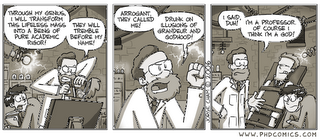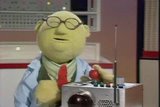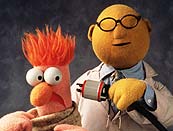I tend to give alot of notes and some students have expressed frustration that the act of note taking prevents them from actually learning. That is pretty much why I am going to the Tablet PC this year and will drop the course notes on the website. I would note however that the issue of learning and note taking has been the subject of academic research.
Teaching Tips: Strategies, Research,and Theory for College and University Teachers by Wilbert J. McKeachie; D.C.Heath and Company, 1994
ISBN # 0-669-19434-4; pages 59 and 60.
"Several studies show that students who take notes remember material better than a control group not taking notes even though the note takers turned in their notes immediately after the lecture. Note taking involves elaboration and transformation of ideas, which increases meaningfulness and retention (Peper and Mayer, 1978; Weiland and Kingbbury, 1979). But note taking has costs as well as benefits. Student strategies of note taking differ. Some students take copious notes; others take none. We know that student information processing capacity is limited; that is, people can take in, understand, and store only so much information in any brief period of time.
Information will be processed more effectively if the student is actively engaged in analyzing and processing the information rather than passively soaking it up.
Students' ability to process information depends upon the degree to which the information can be integrated or "chunked." No one has great ability at handling large numbers of unrelated items in active memory. Thus when students are in an area of new concepts or when the instructor is using language that is not entirely familiar to the students, students may be processing the lecture word by word or phrase by phrase and lose the sense of a sentence or of a paragraph before the end of the thought is reached.
This means that lecturers need to be aware of instances in which new words or concepts are being introduced and to build in greater redundancy as well as pauses during which students can catch up and get appropriate notes.
Snow and Peterson (1980) point out that brighter students benefit more from taking notes than less able students. We believe that this is because the less able students cannot, while they write their notes, keep what they hear in their memories, so that their note taking essentially blocks them from processing parts of the lecture. But this is not simply a matter of intelligence; rather a student's ability to maintain materials in memory while taking notes and even to process and think about relationships between one idea and other ideas depends upon the knowledge or cognitive structures the student has available for organizing and relating the material. Thus the background of the student in the area is probably more important than the student's level of intelligence.
Some faculty members hand out prepared notes or encourage the preparation of notes for students to purchase. Hartley's research, as well as that of Annis (1981) and Kiewra (1989), suggests that a skeletal outline is helpful to students but with detailed notes students relax into passivity. It is better simply to provide an overall framework which they can fill in by selecting important points and interpreting them in their own words, Because student capacity for information processing is limited and because students cannot stop and go over again a confusing part of a lecture, you need to build more redundancy into your lectures than into writing, and you need to build in pauses when students can catch up and think rather than simply struggle to keep up."





















